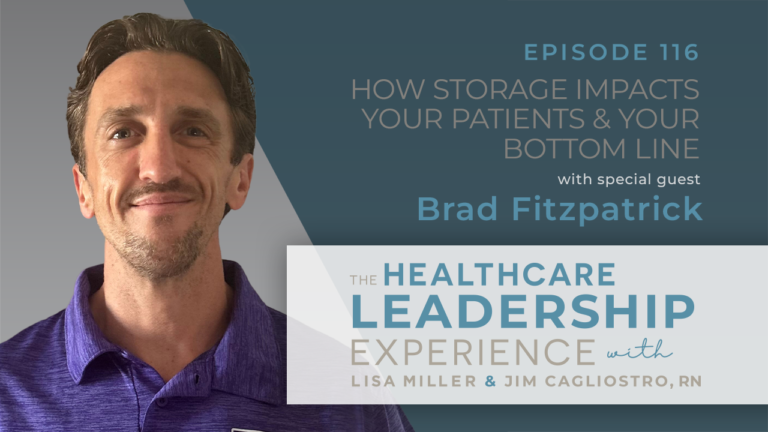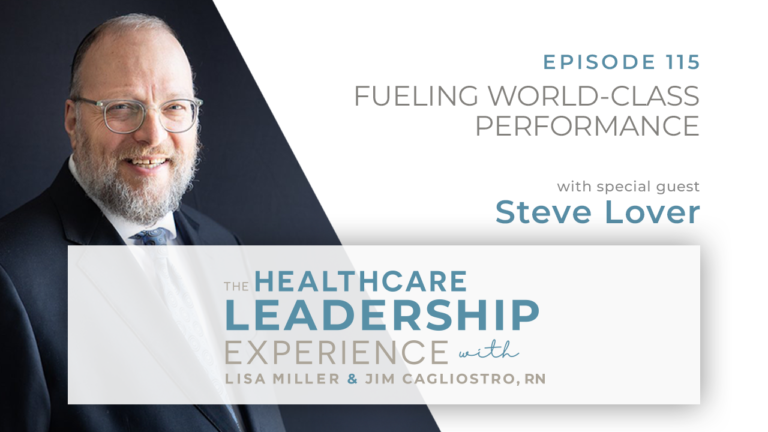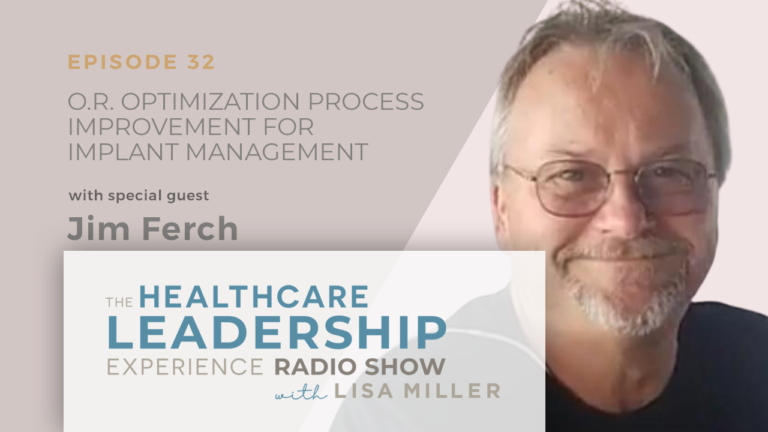The #1 Focus of Every Physician Is Spending More Time With Their Patients
In Episode 39 of The Healthcare Leadership Experience, Lisa is joined by Douglas Farrago MD, author of 7 books. Together they explore the topic of his latest book The Hospital Guide to Physician Retention: Why Creating a Physician-Friendly Environment Is Critical For Your Organization’s Success, in more detail.
As Doug notes, ‘’ (hospitals) … are losing doctors and they keep worrying about recruiting…. they’re not worried about the holes in their bucket….If you don’t patch those holes in that bucket by retention, it makes no sense.’’
This episode is sponsored by VIE Healthcare Consulting® which has proudly helped hospitals save $772 million since 1999.
In this episode you’ll hear:
- The reasons for the current physician shortage in the US from the physician’s point of view. ‘’ Great leaders create great environments…if you have a great environment, doctors are happier, they’ll stay, and recruit other doctors for you and keep your patients happy.’’
- The unlikely similarities with the Stephen Spielberg movie ‘’Catch Me If You Can.’’
- The key factors that make up a great hospital environment, and the impact of the disappearing doctors’ lounge on physician retention.
- The importance of the Net Promoter Score (NPS) and why the gap between tech companies and healthcare organizations matters. ‘’If you’re not doing what you can to keep them, so they are enjoying and working there, then you’re going to have a problem. Every other industry thinks about retention all the time.’’
- Why the #1 focus of every physician is spending more time with their patients.
- One great example of physician liaison; the importance of feeling valued and the BCR (Biscotti Community Referral) Strategy.
- The motivation behind physicianretention.com and why every healthcare organization needs a physician retention strategy. ‘’Ask a hospital what’s your physician retention rate and they’ll fudge those numbers.’’
- The administrator challenge and the ‘’bureaucratic baggage’’ impacting healthcare.
For more on patient care, listen again to Episode 19 Cost Aware For Patient Care.
What To Do Next:
- Subscribe to The Cost Advantage for Healthcare Leaders and receive a special report on 15 Effective Cost Savings Strategies
- Learn more about the simple 3 step process to work with us.
- If you are interested in learning more, the quickest way to get your questions answered is to speak with one of our margin improvement experts. Schedule a call with our team.
Connect with Doug:
Connect with Lisa:
📧 lmiller@spendmend.com
📱https://www.linkedin.com/in/lisamiller/
Episode Transcripts:
CLICK HERE TO DOWNLOAD THE PDF TRANSCRIPT
CLICK HERE TO OPEN THE TRANSCRIPT
Introduction (00:02):
Welcome to The Healthcare Leadership Experience radio show with your host, Lisa Miller. Lisa is an entrepreneur, inventor, advisor, and founder of VIE Healthcare Consulting, the leading healthcare advisory and analytics firm, helping hospitals accelerate their margin improvement goals.
Lisa loves to think differently and collaborates with leaders and their teams to solve challenges and to create new innovative approaches that impact the clinical and business side of healthcare.
Our show will bring you leaders and innovators within healthcare and across multiple industries. Be a part of the discussion that will give you a unique perspective, deep insights, and roadmaps to successfully help you navigate the clinical, financial, and operations of healthcare. Your show starts now.
Lisa (00:49):
Hello. You’re listening to The Healthcare Leadership Experience Radio Show on HealthcareNOW Radio, and I’m your host Lisa Miller. Today we have on the show, Dr. Douglas Farrago. I’m really excited about this conversation. And I think he’s going to really enlighten us on physician retention strategies. He wrote a great book called The Hospital Guide to Physician Retention: Why Creating a Physician-Friendly Environment Is Critical to Your Organization’s Success. So lots of discussion on this, Doug. Welcome to the show.
Doug (01:25):
Hey, thank you. I appreciate you having me.
Lisa (01:27):
So can you give our audience some background on you, a little bit about your career. And you have such a diverse background, you’re entrepreneurial, you’re an author, speaker, inventor. I would love for you to give everyone a background on you.
Doug (01:42):
I’ll just give a quick background. I’m almost 57. I’ve been in medicine for 30 years, I’ve retired from clinical medicine at age 55. I’ve worked for two different hospitals for 15 years up at Maine at one point and then I did the direct primary care. And I’m one of the people that really pushed that to be independent. Yes, I have invented what’s called the knee saver cryo helmet. I’ve written 7 books now and I do MedicalSpeakers.com. You’ll see me, I do talks.
Doug (02:08):
This one was important for me to get this book out because I went into direct primary care to have autonomy and an agency back. But I left a lot of doctors behind, and I’ve been studying this thing for 10 years after I left those hospitals, well, actually more now, that they’re losing doctors and they keep worrying about recruiting and they’re not worried about the holes in their bucket. They just keep trying to fill the water up on. If you don’t patch those holes in that bucket by retention, it makes no sense. And it costs half a million dollars to replace a doctor at least and there’s so many reasons why that is. So I jumped on this and I just realized no one’s doing this, no one really is doing this. So I spent a lot of time and that’s why this book has gotten popular, both positive and negative.
Lisa (02:53):
Yeah, I can imagine you probably have both ends of the coins. Sometimes speaking the truth, people don’t always like that. But I agree that physician retention is so key and it’s going to be an interesting discussion because there’s two sides, it’s the administrators, it’s also the different department leaders. But the physicians really have such a big part of the organization’s success. So can you give us a quick summary of the book and just an overview, the summary, the basic message of the book, what someone would learn as they read through your guide?
Doug (03:26):
Sure. I mean, listen, basically we all know there’s a worker and physician shortage. I explain why physicians are burning out — they’re quitting, they’re retiring, there is doctor suicide per day. Now I’m not trying to point fingers at any one situation, but that’s an issue. If you understand that, you have to understand some of the other reasons doctors are leaving. I try to point that out from a physician point of view. And I point out in my book that I’m like the Frank Abagnale. If you remember the movie Catch Me If You Can by Spielberg with DiCaprio. And he was the guy always passing in false check. And they realize the government, they just hire this guy because he knows all the background stuff. Well, I know what’s going on because I’ve been on every committee, I’ve been in every leadership thing. I’ve practiced leadership, all the parts of the organization, as well as the physician point of view. So I know that point.
Doug (04:14):
So I try to explain why physicians are where they’re at, how come they don’t trust consultants, how come they having some problems with administrators, how come they have problems with the job itself to show why this is important for people to understand. And then I try to explain that recruitment is not retention, they’re different. You can’t just keep recruiting — you have to have something to keep doctors happy. Great leaders create great environments. And so if you have a great environment, and I’ve seen this, doctors are happier, they’ll stay, and they’ll recruit other doctors for you and they also keep your patients happy. The reverse is true. And I’ve seen that as well in one hospital where we used to recruit other doctors because we loved working there and then things changed and people left. And so I explain all that.
Doug (04:58):
And then the second part is actual items, which we can go through later, of things that hospitals can do. But I think it’s important, if you don’t have a physician retention program, new hospital executives out there, great, you don’t have to have one. But if you’re losing doctors, a good hospital is going to have a great one and those doctors are going to go to that hospital. And doctors are talking more and more and there’s validated tools that just to be asking, for example, what’s your NPS score, Net Promoter Score, to see if you’re actually a physician-friendly hospital. So I think if you ignore this, it’s at your own peril.
Lisa (05:30):
So I really want to jump into your specifics. I want to start with your definition of what a great environment is. What does a physician consider a great hospital environment?
Doug (05:41):
Well, it’s a tough one, so that’s a lot of confounding variables. So first example, can you analyze and say, is it physician friendly? Well, how do you define physician friendly? Well, I use what’s called the Net Promoter Score in the book as a validated tool. It has to be done by a third party. And if you asked doctors, would they recommend this hospital for another colleague to work at? That’s it, one question. Because doctors freaking hate surveys and they hate going to too many committees and asked to be too many things. So one question, and that’s a validated tool. And if you get a certain score, you would see if your hospital actually is physician friendly.
Doug (06:16):
Now, tech companies will be positive 50 and most healthcare companies are minus 20. So it looks like physician-led organizations are plus 20. So there’s a way to do that as a validated tool. That’s just one way to see if you’re physician friendly. Now, there’s variables, in my opinion, what would make things better. But I can tell you that happy doctors stay and how do you get a doctor to be happy? If a doctor feels that he’s valued, that he has meaning in his work, meaningful relationships with his patients and his colleagues, that’s an important thing right there to make them happy.
Lisa (06:49):
So as you’re consulting or working with hospitals on creating a physician-friendly and environment and working on the version of a Net Promoter Score, how are you helping hospitals that make the shift, right? So there’s variables on what a great environment is, it’s true people have to be valued, they have to have meaningful relationships. Those things are very universally true. Do you think there are specific issues with physicians though that administrators and physicians don’t see eye to eye on? Are there certain things that really get physicians saying, “This is not a physician-friendly environment?”
Doug (07:29):
Well, there’s some easy mistakes and then there is things that have to be evaluated. I think you have to have a good consultant, and I put this in the book. And this is not easy because physicians just don’t trust consultants. I’ve been through some amazing experiences, doctors just don’t. Now, I’m not saying every doctor and I’m not saying every consultant, but I can tell you that there are easy things, actual items right off the bat. Do you want to analyze whether your place is physician-friendly or not? If you want to take that on, we can do that and find you what your score is to see if they have a problem or not. Maybe it’s perfect, why would you need to prove something if it’s not broken?
Doug (08:02):
But the things that are happening now doctors’ day is ignored in 50% of most hospital organizations. There’s no doctors’ lounge, doctors would be called providers, and doctors are being replaced and they’ve been told that we can just replace you. And that this doesn’t even make sense. This battle with administration and doctors, if you look at organizations that they know what tech is going through right now, they’re doing anything. They’re having, not that this should happen in hospitals, but you’ll read articles, “Oh, we have a bar for after work, we have catered lunches and everything else.” And this is for a guy coming out of college in tech.
Doug (08:36):
These are physicians, don’t even have a lounge, don’t feel respected it and feel devalued. I’m not pointing fingers saying you administrators are all evil and that’s the problem I’m getting, I guess, and pushback. I understand the healthcare system is broken, a lot of these things have happened. So I’m not trying to say you, you, you. What I’m saying is here’s what you can do, it’s not going to fix everything, but you may want to acknowledge doctor’s day in some type of event, you may want to have a doctor’s lounge, you may want to get a physician liaison. Those things are really going to help. And then there’s tons of other things that I do mention in the book.
Lisa (09:07):
Yeah, I absolutely agree with you. I think that we need to have a fantastic doctor’s lounge and really treat physicians in such a way that they do feel valued and those extras do matter. And even just the amount of pressure and the amount of patient load. Just even with COVID, we’ve got to think outside the box in how we care for physicians and clinicians, the nursing and the other clinical staff.
Doug (09:34):
I think they all need to be like that, I agree. And I try to make in the book that. But there is a distinction, physicians who lost their whole youth to education and training coming out in their 30s have aged very quickly in life. So there is a stratification. And I’m not trying to stroke doctors’ egos because there’s a lot of doctors who are jerks and think they’re God still, but I think it’s a lot less. I just think that there has to be, if you don’t feel that the leadership should be the physicians in your hospital, I think you’re going to have a problem. And if you’re not doing what you can to keep them there so they are enjoying and working there, then you’re going to have a problem that it’s again at your own peril.
Lisa (10:11):
I absolutely agree. So I have an interesting perspective from my own consulting practice. And we have to work with doctors quite a bit. And we get a little different response because we do understand their role and we are very data driven, collaborative, discussion driven, giving them ideas is part of this strategy, we need them, and we get a different result. So in your experience, let’s say there’s some kind of initiative, a margin-improvement initiative, it could be any kind of financial initiative, I think this is also the sticking point with some physicians, whether they’re being asked to change something or sit in meetings or make some decisions, do you find that that’s a tough area for physicians to be in?
Doug (11:00):
100%. You remember all we want to do is treat patients and get them better. So the financial piece, we tend to, if you’re not owning your own practice, ignore. In a doctor’s mind, he’s going to go or she’s going to go to that meeting and hear about grinding out different data to get more metrics so the government could pay a little bit more. And you’re like, “I just want to blow my brains up, I just want to go see patients.” So, is it right or wrong? It doesn’t matter, I’m just telling you that perspective.
Doug (11:30):
So if you have to keep in mind you’re taking their time away from seeing patients for improvements that may not help. Now, if it was an improvement system or a plan that maybe you do with your consulting to streamline and make their office work smoother so they can have more time with patients, they’re all in, they’ll buy in on that. If it’s about the government’s going to give an extra 1% if we do this, this, and this, which is extra work for you, so come on guys, you can do this, yeah, we’re not doing that. I’m just going to tell you what we think.
Lisa (11:59):
Actually I love the point you made, helping the physicians on a process-improvement, helping them to see patients or to make the flow better than the physicians are in. And I love that, I think that’s important because our job, administrator’s job, is to make that flow, to make that care process smoother and easier, right?
Doug (12:18):
Correct.
Lisa (12:19):
So I agree. What happens when it’s not the 1% more, they’re looking at patient satisfaction scores or whatever the case may be? What if it’s where these are physician-driven preference items. Because physicians drive a lot of the choices for costs. What’s your take on how an administrator or how we should be speaking to physicians? An example might be, let’s say an orthopedic physician and looking at their implant costs and not changing the way they do their surgeries or asking them to change the implants, but maybe being on board because the administrators have benchmark pricing and they pay more. Now they’ve got a relationship with the vendors and now you’re asking doctors to be in the middle, you know? How do physicians feel about the cost conversation that doesn’t require changing practice, but maybe put some in an uncomfortable position?
Doug (13:14):
Well, if you look at it through their lens, our lens, it’s always like, “Okay, patient care is first.” If I’m an orthopedist and I’m not, I’m a family doctor, but if I was comfortable with X, Y, Z implant and I’ve used it 1,000 times and now you can do another one cheaper that the organization wants to use, cheaper but I’ve never used that product. So you have to see from their perspective that there’ll be pushback. That’s that kind of thing that you would get from doctors. The lens is always the same. It’s not about, “Hey, heck you’re not paying anymore.” It’s like, “Okay, I want my patient care to have better visits, quality visits, longer visits and so I can do the job that I always want to do.” And if you’re taking away from that with bureaucratic drag, then I don’t like it.
Lisa (13:54):
I completely understand that. The hospitals have to be sensitive to physician’s time. I think that not changing a physician preference but maybe engaging them. Let’s say as a primary care, you were probably ordered lab test. And maybe not changing the way you ordered test or what you ordered, but maybe engaging you in the support of those vendors that really a lot of the physicians have relationships with. And so I think it becomes challenging for the administrators sometimes because they’re the outsider in that relationship.
Doug (14:27):
I 100% agree. I don’t think I could ever be an administrator. I have great friends that are CEOs, I have people that probably have put out hits on me that CEOs. So I have it both ways that I kinda understand that I can’t walk in those shoes. And I think that’s part of… If you had a physician retention program, part of that, I think a physician liaison would help in a lot of the stuff. And I do think the committees that have done right, and I think you have to pared them down, but they have to be done right, would really help because if doctors have some agency in control and felt heard, and that’s the key. I give examples in my book over and over again where doctors just don’t feel heard or even recognized.
Doug (15:07):
I put an example in my book, I remember one from one hospital to the other and the CEO hugged me and that we brought our patients over, it was fantastic. Six months or a year later, I went to a restaurant, and I sat right next to him and he didn’t recognize me, didn’t know who I was. So, okay, that sits well with me, not at all. So that’s a very simple thing. Hey, how about knowing who I am? And so there are some things that you can do that are not being done.
Doug (15:30):
So when I put my book out, I sent advanced copies to a lot of administrators, I got some horrific feedback. And I’m not really sure why because the bottom line is, I truly want to help the physician work environment, which would help you. I’m biased, I mentioned that in the book. I’m pro-physician, I get that, that’s my perspective. But a better work environment keeps doctors and saves you lots of money. So I’m not really sure why there was some people that were so bothered. Either they were in denial of the problem or maybe they think it’s a doctor issue, you need to be more resilient, which doctors off, or maybe there’s some contempt for doctors and they feel it can be replaced. But the bottom line is, you going to have to get along. And you may want to think about this because every other industry thinks about retention all the time. I’m not really sure why there’s no programs in medicine doing this.
Lisa (16:16):
I absolutely agree. Can we talk about what you would consider is a great physician liaison strategy?
Doug (16:24):
I think what I had when I first started, this is how simple it is, I can’t even tell you, this’ll be laughable to an audience. I think physicians can be simple creatures. So when I first started, there was a doctor’s lounge in this one hospital, which was nice. And it was doctors only, which I think was important. There was fresh coffee and biscotti there, which one of the things the physician liaison, which was an ex-nurse got. And then she also did other of things, got us our jackets, any little things we needed for the office. She was the one person not dealing with salaries or negotiations or major issues, but those small things that you know you can contact. And she was a great person, her name was Jane and she was just wonderful. And that biscotti, that sticks with me today because we enjoyed where we worked, we felt valued, there was a community of physicians which physician liaison helped do with parties and things like that. We felt like we knew each other and then we just kept recruiting.
Doug (17:23):
So I remember there was a third year resident, two of them that recruited me. I was a first year resident. And two years later, I went to work in this hospital. We ended up recruiting two more, then two more, then two more. We got them ten. We built their family practice department to compete against the other hospital across town and it just was phenomenal. And that goes back to the biscotti almost. The simple things, doing those simple things and having someone in charge of doing those simple things that you feel like, “Wow, it’s really cool they do that.” And we used to brag about. And if we brag about the hospital, you can’t really give even a score how important that is. So a physician liaison would be that amongst other things, which I mentioned in my book. And I think it could be decided on what they do by physicians. But I do think you need someone to do that.
Lisa (18:08):
Absolutely. So right after our short break, I want to talk to you about your BCR strategy. And I’m going to tell you what that is.
If you’re just tuning in, you’re listening to The Healthcare Leadership Experience Radio Show on HealthcareNOW Radio. And I’m Lisa Miller, your host. Today, I’m joined with Doug Farrago, he is the author of 7 books. Today, we’re talking about his most recent book, The Hospital Guide to Physician Retention: Why Creating a Physician-Friendly Environment Is Critical to Your Organization’s Success. This show was sponsored by VIE Healthcare, the leading healthcare advisory and analytics firm, helping hospitals accelerate their margin improvement goals since 1999. You can learn about VIE Healthcare at viehealthcare.com.
Lisa (18:52):
So Doug, I have it laid out, it’s your BCR strategy, it’s your biscotti community referral strategy. So you have this great thoughtful nurse, Jane, who has biscotti. And it could be anything, it could be something warm that you enjoy. But I think what you said was pretty interesting, and it’s about probably she created community, or the physicians created a community and there was an atmosphere, an enjoyable atmosphere. It was thoughtful, and as a result, you refer more physicians. Boy, if I was an administrator, that’s the strategy I would be going after because… And like you made an example with tech companies, they have a retention strategy, but they also know that like people will attract like people. So you, that community were such a great referral strategy for new physicians, it’s brilliant.
Doug (19:47):
And it’s true and it happens all the time, but the reverse happens too. If you don’t care about doctors, we just can replace them, we’ll find somebody else. The biggest thing is the denial thing. Ask a hospital or any organization, what’s your physician retention rate? And they fudge those numbers all the time. I mentioned this in the book in an urgent care for a year and I’m like, “You guys are losing people all the time, what’s going on?” “Oh no, our retention, we have an 8% turnover.” And in one small urgent care, and I won’t mention the chain, that was 80 doctors in a year, 80. So you guys are obviously, I’m not saying everybody, but this organization was obviously lying. So the bottom line is if you in denial of the problem and don’t care, the reverse can be true.
Doug (20:33):
Doctors are talking and they will talk bad about you online. And I just saw that recently about an organization in California. So it may be just horrifically explaining everything horrible about what’s going on there. And it’s like, do you want that out there? And so do you either go out there and find that doctor and fire him because he wrote it — or you say let’s fix it. So you can get mad at me for writing this book. And I can I understand it, we all have egos, and I don’t have an ego.
Doug (21:01):
9 out of 10 administrators hate this book because the bottom line is I’m looking for that one. And I couldn’t find an organization truly that works on physician retention, so I created now. I’m doing consulting and if you go to physicianretention.com, you can see that. And speaking on this subject, if you go to medicalspeakers.com, I’m there as well. But the bottom line is, no one was doing that. I’m like, “Someone’s got to help this because it’s so easy.” Every other business and industry does this. But for some reason we don’t do it in medicine, we don’t care, it makes no sense.
Lisa (21:32):
So I have a couple of more questions for you. You mentioned earlier that you’ve been involved with physician-led organizations. Do you find, as you mentioned earlier, that they have a better Net Promoter Score? Do you find overall that if it’s a physician-led organization that the physicians are happier?
Doug (21:48):
So I’ll break that down a little easier. Escaping the name of the author, it’s in my book, of who started the Net Promoter Score, which is one of the most commonly used ways to see the quality of your organization. And so he has actually studied that and I just refer to those studies. Which is physician-led organizations are positive 20 and most hospitals are in the negative range, about a negative 19 I think. And that’s in my book as well. Now, do I feel physician-led ones, doctors are happier. I’ll tell you the most happy doctors I find or what I did in direct primary care is when I left primary care to open my own practice again and did a membership model where I was the boss and had agency and control over my lifestyle. And yes, there were was other issues that can burn you out. But I enjoyed medicine again because I had more time with patients and I felt I had a more meaningful relationship with patients.
Doug (22:37):
So what I’m trying to bring back to those who are still stuck in the system, because everybody can’t do this and I get that, is how do these doctors get that feeling again in the hospital if they work either as a specialty doctor or as a primary care doctor, how did they get the feeling that I was getting in direct primary care when I owned my own practice? And there are ways to do that. It’s not easy, by the way, when you have so much bureaucratic drag. Not all by administrators, the government and insurance companies, which wanting to go in on that, cause so much extra work that doesn’t help patient care. If we can eliminate that, we wouldn’t have an issue in the industry. But that’s why they are better because I think they have more agency over their life.
Lisa (23:17):
If you have concierge practice, you’re not burdened by insurance, all the things that they’re not always an administrator’s fault, it’s the revenue cycles, the payment cycle. It’s all those things that are very different from patient care. And makes sense that would be something physicians don’t want to do, is to get involved in the business side. Unfortunately, we all have to live together in that world.
Doug (23:40):
I agree with you 100%. Listen, I think administrators can say, “Wait a minute, what if the whole world didn’t have these insurance companies we’d be paid in some type of model.” They would love not dealing with these metrics and other crap too. I get that. So I never said administrators is 100% at fault, I never said their job is easy by any means. But what happens is we’re always chasing our tails trying to make others happy, third parties that are not involved in that room with the patient. And when we do that, it takes away from patient care. So yeah, it’s not an easy job in any hospital, I get that 100%.
Lisa (24:16):
They just wonder if the conversation should just change to look at different streams of process and flow and to ask that question, how can we serve our physicians in such a way they could see more patients? And you know, Doug, if they did that, it would have happier physicians. But by seeing more patients, it’s also good for the hospital. So you just wonder, are we asking the right questions? Are we getting on the brainstorming board and saying, let’s start with primary care or let’s start with our hospitals. How do we get you in front of the patients more? What’s your biggest bottleneck and how can we solve that for you?
Doug (24:49):
But that goes right against all the metrics and all the other things that were added. So it’s a battle because the truly way to do this, if you remove that bureaucratic baggage and I’m actually just spending time seeing that patient, it’s not so many more patients, but more time and doing a better job because I have more time.
Hey, if I’m flipping burgers, I’m doing a better job if I have more time versus not more time, I don’t care what the job is. And if I have more quality time with my patient again, that’s the lens we see things through, is that we want better time with our patients, so we feel we get a better job and feel good about what we do, versus an industrialized processing plant. We don’t like that.
Lisa (25:26):
And you make a really good point, more time. You could really get to know a patient better, maybe pick up those nuances, spend more time being proactive or talking about the future. On discharge, I think we really rush patients through, is at a time where care can be slowed down? You’re absolutely right, there’s probably a slowing down, spending more time that we need to focus more on.
So I feel like we could have another two hours of conversation, but I’m really sorry to say that our time is up. But the listeners can learn more about your book at physicianretention.com, which is pretty easy. I was on Amazon, I know you talk about the administrators very upset about your book. But interestingly, you have all five-star reviews. So I know you’re doing a lot right. And you will absolutely be making a greater impact being brave and having an uncomfortable conversation. So thank you Doug, for being on the show.
Doug (26:23):
I truly appreciate it. Yes, if people want to contact me, you go to those websites. If you need speakers to talk to the organization, I’m very open to doing that. I truly want to help people and help doctors. That’s my really ultimate goal.
Lisa (26:36):
That’s great. Thank you for listening to The Healthcare Leadership Experience Radio Show on HealthcareNOW Radio. I’m Lisa Miller the hosts.
Please join us on Healthcare Radio now every day at 5:00 AM, 1:00 PM, 9:00 PM Eastern Time and other podcast apps. If you’ve got any recommendations or topics you’d like us to discuss, please reach out to me. I’m on LinkedIn and also you’ll see my information on the show notes.
Thank you. And we look forward to having more discussions.
Outroduction (27:05):
Thank you for joining Lisa Miller for this episode of The Healthcare Leadership Experience Radio Show sponsored by VIE Healthcare Consulting. If you enjoyed the show, subscribe so you can automatically get notified when new shows premier weekly. Don’t forget to leave us a review so more healthcare leaders like can discover us. This show is on HealthcareNOW Radio, Apple Podcast, Stitcher, Spotify, Pandora, and other major podcast platforms.
To reach out to Lisa personally, you can join the conversation on LinkedIn, where Lisa continues to have discussions on the business of healthcare. You can find links to Lisa’s other social platforms in the show notes or at viehealthcare.com. The Healthcare Leadership Experience Radio Show is the think differently communication for healthcare leaders. And we are honored to have you tune in.
Join us next week for another episode of The Healthcare Leadership Experience Radio Show.











